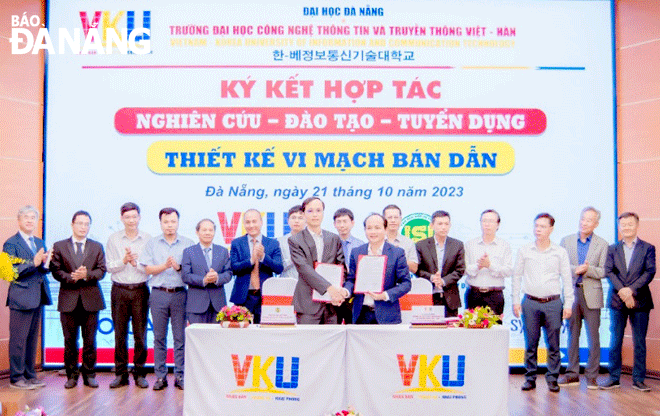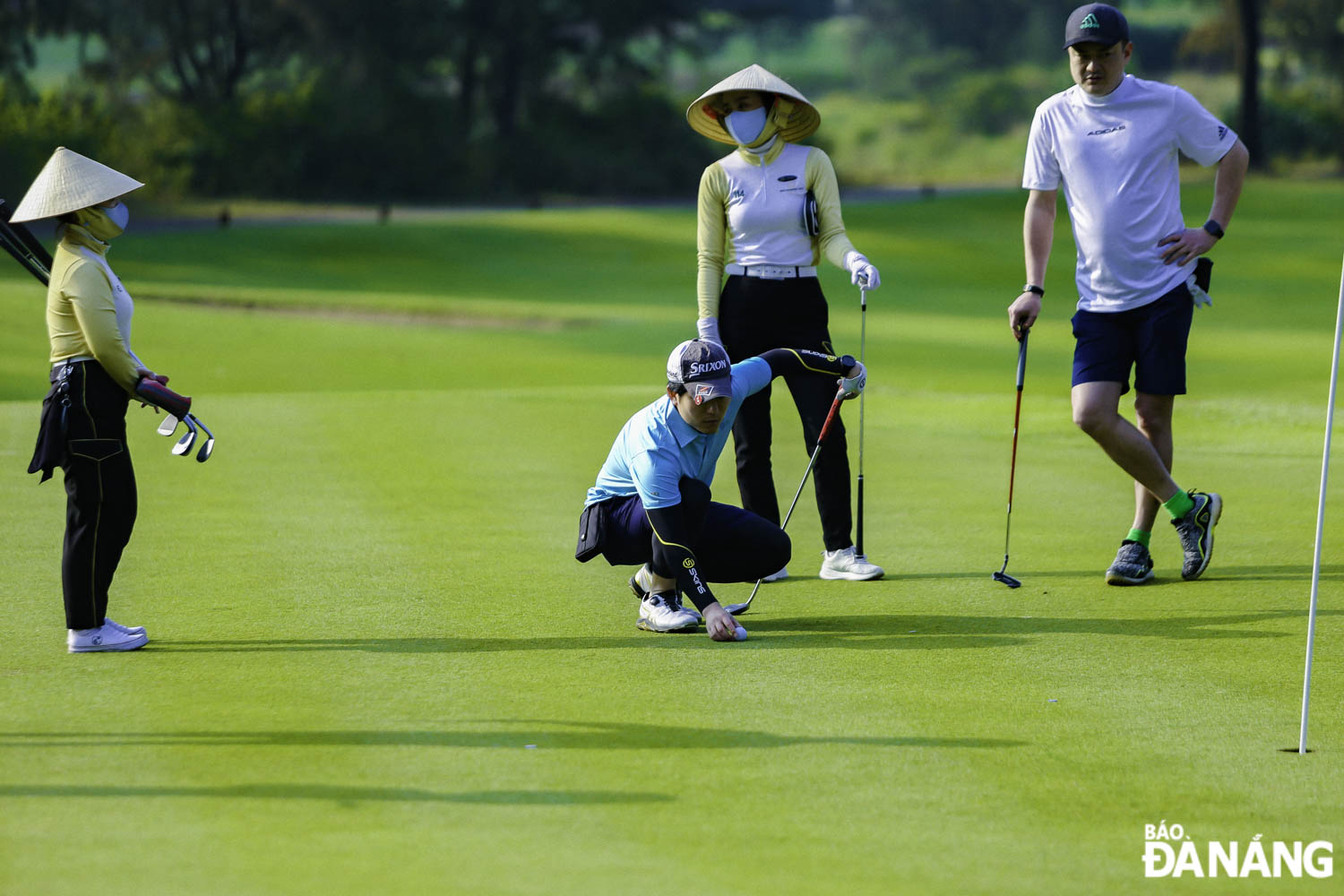Da Nang sets sight on increasing high-quality IC human resource training
One of the important factors to call for businesses to invest in the microchip industry in Da Nang is human resources to serve business operations. Training facilities across the city are stepping up coordination with partners as well as businesses to increase the high-quality IC workforce.
 |
| Representatives of the Viet Nam-Korea University of Information and Communications Technology, a member school of the Da Nang University, sign a cooperation agreement with the Institute of Information Technology under the Ha Noi National University in research and innovation in the field of semiconductor circuit design. Photo: M.Q |
Open the field of microcircuit studies
At the end of October 2023, the Viet Nam - Korea University of Information and Communications Technology (VKU, a member school of the University of Da Nang announced the enrollment in the field of microchip technology.
Accordingly, from 2024, VKU plans to enroll about 500 new students in the IC design field. The training programme includes 160 credits with basic industry knowledge, foundation knowledge, and specialized knowledge of IC design over a period of 4.5 years. By 2028 onwards, there will be students graduating in the field of semiconductor circuit design.
As for the expected training scale in the next 5 years, VKU will have more than 2,000 IC engineers, specifically 600 IC design engineers and 1,500 technology engineers in computer engineering, electronics, embedded systems, and robotics.
As revealed by Assoc. Prof. PhD. Huynh Cong Phap, the Rector of VKU, over the past year, VKU has prepared the necessary conditions to open a major based on cooperation with partners in South Korea. Besides the above-mentioned majors, the school has many training majors with knowledge blocks related to IC technology such as computer engineering, embedded systems and Internet of Things (IoT) and IT.
The entrance admission score of the above-mentioned programs is very high. Combined with the working, research and learning environment at VKU, graduates of the above majors are qualified to participate in the IC production chain. The school is implementing a project to improve education - training, management and research capacity for the 2022 - 2027 period funded by the South Korean Government.
Under the project, developing a microchip technology training programme is one of number of contents. Specifically, the project funds the construction of practice - experiment rooms and training equipment for microchip technology. Universities in South Korea will support schools in training teaching staff, developing technical facilities, and applying the latest technology to training programmes.
Another training facility is the University of Science and Technology, a member school of the University of Da Nang, with 5 faculties training 7 majors with nearly 30 IC-related subjects in the programme frameworks. The total number of graduates from specialised majors is about 500 each year. The number of lecturers teaching courses related to the field of semiconductor ICs is 20.
In particular, there is one associate professor and three PhDs researching semiconductor ICs. The University has a close relationship with IC design companies with offices located in the Central region such as Renesas, Synopsys, Synapse, Uniqify and Savarti.
Every year, this tertiary establishment coordinates with companies to support students to make graduation projects, with a focus on quickly approaching and solving real-life problems from businesses, and businesses can also recruit students immediately after graduation.
Assoc. Prof. PhD. Nguyen Huu Hieu, the Rector of the Da Nang University of Science and Technology said that the programmes are designed to ensure that they equip learners with basic, industry-based and specialised knowledge that can meet the requirements of working at businesses operating in the circuit design industry.
In addition, students studying a field close to IC can participate in a short-term training course lasting 2-6 months to work in this field.
For example, through basic subjects such as electronic components, semiconductor physic and semiconductor devices, students can grasp the different technologies used to create semiconductor ICs, especially focusing on MOS field-effect transistors (MOS FETs) are the most commonly used technology today.
To serve the training of practical modules related to the field of microcircuits, the school has laboratories for microcontroller techniques, power electronics, embedded systems, materials technology, electronic measurement, precision measurement, electronics workshops, computer lab and high-performance computing.
Need policies to attract high quality human resources
According to Assoc. Prof. PhD. Huynh Cong Phap, in an effort to develop human resources in the field of microchips, Da Nang needs to deploy a training programme on selective microchip technology like the model of Ho Chi Minh City, the High Technology Centre, in cooperation with the Synposys Group.
Accordingly, lecturers have access to software, equipment, and actual IC design processes at enterprises, implement an acceleration programme for excellent students in IC design to help them ready to apply for positions in IC manufacturing after graduation.
Also, it is necessary for the city to develop policies, proactively call for microchip businesses to come to Da Nang in combination with creating favourable conditions for their operations, and at the same time connect businesses with universities in Da Nang. The city can research and build funds for granting scholarships, scientific support and microchip startups from contributions and sponsorships from businesses and the city’s government.
Meanwhile, Assoc.Prof. PhD. Ha Dac Binh, Principal of the School of Technology, the Duy Tan University, proposed that the city quickly and synchronously deploy a STEM education programme combining four fields: science - technology - engineering - mathematics in high schools to ensure early career orientation for pupils there.
The city should preside over the connection of leading domestic and international IC design units and local universities to build a set of knowledge and skills standards for IC design engineers at each specialized field, develop methods of developing training textbooks that meet the needs of businesses regarding the quality of engineers after training and promote the participation ability of experts and engineers working at the enterprise.
At the same time, the city’s authorities are recommended to timely support universities in the city to build strong research groups, especially researching supporting technologies for Industry 4.0 as well as solutions to support a project to build Da Nang into a smart city.
In his perspective, Assoc. Prof., Ph.D. Nguyen Huu Hieu said that the city needs to have policies to create favourable conditions for universities to invite international experts and scientists or overseas Vietnamese working at foreign companies in the field of microchips to participate in teaching and research processes in Da Nang, with a heed paid to facilitating the issuance of long-term work visas and ensuring more support for them in terms of travel and accommodation costs.
In addition, the city should have policies to attract more FDI enterprises, especially enterprises that not only simply produce but also establish research and development (R&D) centres.
Although R&D centres are not places that create much surplus value and take a long time to see results, this is a place where Vietnamese engineers in general, and those in Da Nang in particular, have the opportunity to deeply dive into the design stages, better understanding technology and come up with new ideas, all of which are the foundation for creating a team of local experts.
This team of experts can start a business and create ‘Made in Viet Nam’ products in the future. Therefore, the city’s administration should issue policies to support taxes and long-term rental fees so that companies can feel secure in investing in the city. However, it is necessary to force R&D centres to have connections with universities for scientific research and support universities in improving research capacity.
Reporting by MAI QUE - Translating by A.THU








